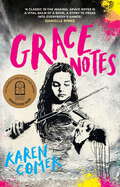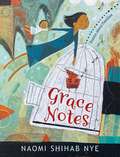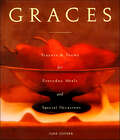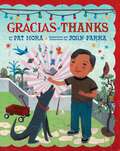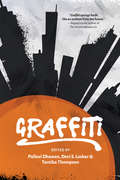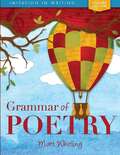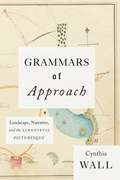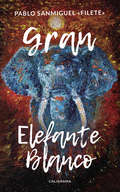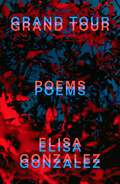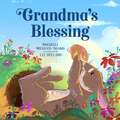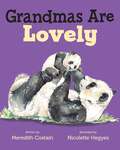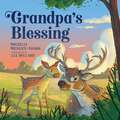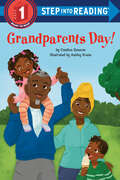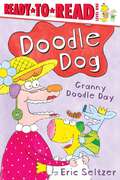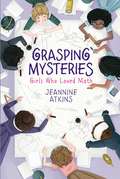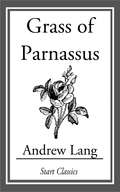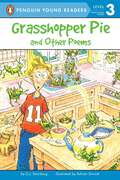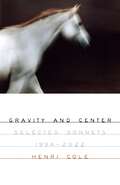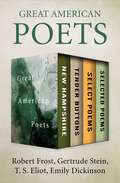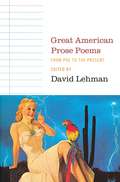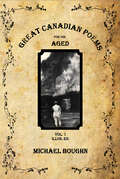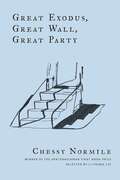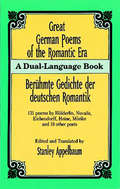- Table View
- List View
Grace Notes
by Karen ComerThis song has a grace note,a tiny note that's there for embellishmentbut can easily be ignored,not played.Tonight, I add it in -just because.We can all do with an extra noteof grace.Grace Dalfinch is a talented violinist who longs to play contemporary music in bars, but her mum forbids her. James Crux is an aspiring street artist who promised his dad he wouldn't paint in public until he's finished school. When Crux witnesses Grace's impromptu performance on a deserted tram, he's inspired to paint her and her violin; and when Grace stumbles across her portrait in a Melbourne alley by an anonymous street artist, she sets out to find its creator.Grace Notes is a debut YA verse novel, set in one of the most locked-down cities in the world - Melbourne, 2020. For fans of Cath Crowley and Pip Harry.'A classic in the making; Grace Notes is a vital balm of a book, a story to press into everybody's hands.'DANIELLE BINKS'Poetry, music and art, woven together in an uplifting story about endless lockdowns and first love.'NOVA WEETMAN'Comer captures the beats of Melbourne's 2020 and the unique experience of a generation of teens in one of the most locked-down cities in the world.'Books+Publishing'Heart and soul triumph over Covid lockdowns and restrictions . . . Karen has used the verse novel to beguile, dance and demand layers of emotion and depth that only poetry can sustain. A masterful debut!'LORRAINE MARWOOD'Like the grace note of the title, this beautiful story strikes the perfect tone, mixing colour, light and music at a time when we needed it most.'NICOLE HAYES
Grace Notes: Poems about Families
by Naomi Shihab NyeWith themes of family, love, kindness, empathy, grief, growing up, and resilience, these one hundred never-before-published poems by the beloved poet, speaker, and teacher Naomi Shihab Nye will resonate with a wide audience.National Book Award finalist and former Young People’s Poet Laureate Naomi Shihab Nye’s Grace Notes: Poems about Families celebrates family and community. This rich collection of one hundred never-before-published poems is also the poet’s most personal work to date. With poems about her own childhood and school years, her parents and grandparents, and the people who have touched and shaped her life in so many ways, this is an emotional and sparkling collection to savor, share, and read again and again.
Grace, Fallen from (Wesleyan Poetry Series)
by Marianne BoruchIn her wry and riveting new collection, Marianne Boruch discovers things often taken for granted and holds them up to deceptively casual light, questioning them both mercilessly and mercifully. Employing a masterly range of tone and form, Boruch makes a sometimes strange but always revealing investigation of world and self, history and memory, resistance and release. Here a woman levitates behind a door as her daughter badly bangs out Mozart. Here God is caught before the moment of creation, before knowledge, before "the invention/ of the question too, the way all/ at heart are rhetorical, each leaf/ suddenly wedded to its shade." It's here raucous boys on their bikes are told—through telepathy—don't go to this war. Here, that a Dutch still life is returned to the small chaos of its making. And Eve, in "stained fascination," stares down the snake of the lost garden. The lyric impulse in these deeply interior poems stops time, even as the world, indifferent to its mystery, keeps happening.Praise for Marianne Boruch:"Her poems are complex rather than simple rooms … they bring the world's strangeness, and their own, home to whatever reader is open to old mysteries, both in dreams and in the waking life they illuminate."—Philip Booth, The Georgia Review"Marianne Boruch's (work) has the wonderful, commanding power of true attention: She sees and considers with intensity. Her poems often give fresh examples of how rare and thrilling it can be to notice."—Robert Pinsky, Book World, The Washington Post"Every detail of image and syntax shines with multiplicity."—Donald Revell, The Ohio Review
Graces: Prayers & Poems for Everyday Meals and Special Occasions
by June CotnerSaying grace at mealtime is a time-honored tradition for many families and a newfound source of spiritual connection for others. Whether you're a master at giving the blessing or fairly new to this sacred art, Graces will bring inspiration to your meals and special gatherings.Seeing the need for such inspiration at her family's table, June Cotner compiled a notebook of poems, prayers, and songs that she solicited from friends, strangers, family members, and ministers. She has turned her family's well-worn notebook into this elegantly packaged edition, which will complement your finest table settings.Arranged by thirteen themes, this beautiful gift book contains poems, prayers, songs, invocations, and salutations by figures as diverse as Leunig and Browning, Emerson and Starhawk, Kahlil Gibran and Schweitzer. Whether you need a Sanskirt Salutation to the Dawn, a Gaelic Blessings, or ancient Chinese Prayer, Graces offers fitting words for every occasion.Having a collection of original, traditional, and multicultural blessings makes it easy to share wisdom and insight with family and friends before meals or at special gatherings. The graces compiled here have been used by people of all religions beliefs, and special attention was given to how easily the words can be spoken by both adults and children.Life if full of occasions when it seems appropriate to say grace. Graces contains 133 prayers, poems, and blessings that span the centuries and draw from many traditions. Bring spiritual focus to your meals by bringing Graces to your table.
Gracias • Thanks
by Pat MoraPura Belpré Illustrator Award Honor - American Library Association (ALA)In a series of poetic sentences, a young boy (biracial Mexican/Caucasian) tells about some of the everyday things for which he is thankful.There are so many things to be thankful for. For one young boy, it'sflying ladybugs,splashing ocean waves,a best friend,Dad's thick chocolate syrup,and much more. Straight from the heart of a child flows this lighthearted bilingual celebration of family, friendship, and fun. Come share the joy, and think about all the things for which you can say, "¡Gracias! Thanks!"
Graffiti
by Pallavi DhawanTo create this inaugural anthology from artist collective POC United, the editors of Graffiti gave the contributors a special challenge: to write in a way that centers neither "whiteness" nor "anti-whiteness” and that is not limited by their struggle, their oppression, or how their characters will be received by the white imagination. The results are joyous and mind-expanding. Through poetry, short stories, and essays, the works in Graffiti expose lives that move in unexpected ways, rendering characters who don’t fit the cultural tropes we cling to. Graffiti shows what writers of color do when they are invited to scribble, scrawl, romanticize, and speculate without being politicized or exoticized.
Grammar Of Poetry: Student Edition
by Matt WhitlingThis is the ideal introductory text for students and teachers discovering the art of poetry. As a "grammar," it teaches the fundamentals of poetry from scansion and rhyme to more advanced concepts like spatial poetry and synecdoche. Using the classical methodology of imitation (advocated by educators like Quintilian and Benjamin Franklin), this text makes students become active participants as they learn the craft of writing poems. It also offers practical tips and helps, including how to use a rhyming dictionary, how great writers use figures of speech effectively, and even when to break the rules of poetry. Its goal is to show students how to capably interact not just with poems, but with language in any situation. Developed and used at Logos School with great success, the thirty lessons in Grammar of Poetry contain instruction on ten powerful tropes, student activities for every chapter, riddles to solve, a glossary of terms, a list of over 150 quality poems to integrate, and real-life examples from Shakespeare to traditional tongue twisters. It is designed for a semester at the 6-9th grade level, but is perfectly appropriate for anyone with basic writing skills and the desire to learn poetry.
Grammars of Approach: Landscape, Narrative, and the Linguistic Picturesque
by Cynthia WallIn Grammars of Approach, Cynthia Wall offers a close look at changes in perspective in spatial design, language, and narrative across the late eighteenth and early nineteenth centuries that involve, literally and psychologically, the concept of “approach.” In architecture, the term “approach” changed in that period from a verb to a noun, coming to denote the drive from the lodge at the entrance of an estate “through the most interesting part of the grounds,” as landscape designer Humphrey Repton put it. The shift from the long straight avenue to the winding approach, Wall shows, swung the perceptual balance away from the great house onto the personal experience of the visitor. At the same time, the grammatical and typographical landscape was shifting in tandem, away from objects and Things (and capitalized common Nouns) to the spaces in between, like punctuation and the “lesser parts of speech”. The implications for narrative included new patterns of syntactical architecture and the phenomenon of free indirect discourse. Wall examines the work of landscape theorists such as Repton, John Claudius Loudon, and Thomas Whately alongside travel narratives, topographical views, printers’ manuals, dictionaries, encyclopedias, grammars, and the novels of Defoe, Richardson, Burney, Radcliffe, and Austen to reveal a new landscaping across disciplines—new grammars of approach in ways of perceiving and representing the world in both word and image.
Gran Elefante Blanco
by Pablo Sanmiguel «Filete»¿Habéis visto pasar al Gran elefante blanco? Un elefante blanco es un tipo poco común de elefante. Aunque a veces se describe como blanco níveo, su piel es normalmente marrón-rojiza, volviéndose rosa cuando está mojada. Además, tienen pestañas rubias. En la antigua Siam, ahora llamada Tailandia, los elefantes blancos son sagrados, siendo un símbolo de poder real, por lo que cuantos más elefantes tenga el rey, mayor será su estatus. La expresión «elefante blanco» es atribuida a posesiones que tienen un costo de manutención mayor que los beneficios que aportan, o a aquellas que proporcionan beneficio a otros, pero que únicamente ocasionan problemas a su propietario.
Grand Tour: Poems
by Elisa GonzalezElisa Gonzalez's thrilling debut makes one "feel as if poems have never before been written" (Louise Glück). Grand Tour, the debut collection of poetry by Elisa Gonzalez, dramatizes the mind in motion as it grapples with something more than an event: she writes of a whole life, to transcendent effect. By the end, we feel we have been witness to a poet remaking herself.Gonzalez’s poetry depicts the fullness of living. There are the small moments: “white wine greening in a glass,” trumpet blossoms “panicking across the garden.” Some poems adopt the oracular quality of a parable but invariably refuse a clear moral. The poet moves through elegy, romantic and sexual encounters, family history, and place—Cyprus, Puerto Rico, Poland, Ohio—all constellated in “a chaos of faraway.” The collection is held together less by answers than by a persistent question: How doe you reconcile a hatred for the world’s pain with a love for that same world, which is indivisible from its worst aspects? Gonzalez’s poems draw us nearer to our own aliveness, its fragility and sustaining questions. “Since I do love the world,” she says, she keeps writing, inviting us to accompany her as she searches.
Grandma's Blessing
by Michelle Medlock AdamsThis adorable picture book celebrates one of God's greatest gifts—the love Grandmothers have for their grandchildren. Whether she goes by Grandma, Mimi, Gigi, or Nana—she wears that name proudly. To be a Grandma is a gift, and the love she has for her grandchildren is unconditional and never-ending. In this sweet picture book, grandmother animals tell their grandchildren all the ways they are a blessing in their lives. From celebrating their birth, to watching them grow, to sharing a giggle, to looking for cloud pictures . . . every endearing illustration shows the power of a grandmother&’s love and beauty of that special relationship she shares with her grandkids. Written in easy-to-read, sweet, rhyming text, this book is sure to become a favorite and the perfect addition to every family&’s library. It's sure to be a favorite at bedtime or anytime!
Grandmas Are Lovely
by Meredith CostainA companion to Mommies Are Amazing and Daddies Are Awesome that's all about grandmas and what makes them so wonderful!Grandmas are lovely, they’re joyful and sweet, and when you are with them, each day is a treat. Baby animals of all shapes and sizes cuddle with their grandmas in this gentle, rhyming picture book. There's no bond like the one between grandmother and grandchild!Godwin Books
Grandpa's Blessing
by Michelle Medlock AdamsThis adorable picture book celebrates one of God's greatest gifts—the love Grandfathers have for their grandchildren. Whether he goes by Grandpa, Pops, Papaw, or Grandad—he wears that name proudly. To be a Grandpa is a gift, and the love he has for his grandchildren is fierce and unwavering. Through this adorable book, children, parents, and grandparents are reminded that nobody loves you like a grandparent. From singing songs, to sharing snacks, to skipping rocks, to just hanging out together . . . every page celebrates the special bond a Grandpa shares with his grandkids. The sweet and endearing illustrations and easy-to-read rhyming text are sure to make this book a family favorite and the perfect addition to any library. Inspires family reading timeBrings calm and comfort to kids at bedtimeDestined to become a family keepsake
Grandparents Day! (Step into Reading)
by Candice RansomCelebrate grandparents with this Step 1 reader featuring the kids from Pumpkin Day!, Apple Picking Day!, Garden Day!, and Snow Day! and their family.What could be more fun than spending a whole day with Grandma and Grandpa? Brother and sister get to visit a museum, do crafts, feast on homemade brownies and watch old home movies with their very special grandparents! It's a memorable day full of laughter, good food, and love. Easy-to-follow rhyme ensures a successful reading experience, while bright, lively art brings this intergenerational story to life.Step 1 Readers feature big type and easy words. Rhymes and rhythmic text paired with picture clues help children decode the story. For children who know the alphabet and are eager to begin reading.
Granny Doodle Day
by Eric SeltzerDoodle Dog, King, and Bear set aside their artwork for the day to visit Granny Doodle. Once there, they get to eat Doodle Noodles, play, and give Granny a pretty present. Days with Granny are doggone fun!
Grasping Mysteries: Girls Who Loved Math
by Jeannine AtkinsLearn about seven groundbreaking women in math and science in this gorgeously written biographical novel-in-verse, a companion to the &“original and memorable&” (Booklist, starred review) Finding Wonders: Three Girls Who Changed Science.After a childhood spent looking up at the stars, Caroline Herschel was the first woman to discover a comet and to earn a salary for scientific research. Florence Nightingale was a trailblazing nurse whose work reformed hospitals and one of the founders of the field of medical statistics. The first female electrical engineer, Hertha Marks Ayrton registered twenty-six patents for her inventions. Marie Tharp helped create the first map of the entire ocean floor, which helped scientists understand our subaquatic world and suggested how the continents shifted. A mathematical prodigy, Katherine Johnson calculated trajectories and launch windows for many NASA projects including the Apollo 11 mission. Edna Lee Paisano, a citizen of the Nez Perce Nation, was the first Native American to work full time for the Census Bureau, overseeing a large increase in American Indian and Alaskan Native representation. And Vera Rubin studied more than two hundred galaxies and found the first strong evidence for dark matter. Told in vibrant, evocative poems, this stunning novel celebrates seven remarkable women who used math as their key to explore the mysteries of the universe and grew up to do innovative work that changed the world.
Grass of Parnassus
by Andrew LangAndrew Lang (1844-1912) was a prolific Scots man of letters, a poet, novelist, literary critic and contributor to anthropology. He now is best known as the collector of folk and fairy tales. He was educated at the Edinburgh Academy, St Andrews University and at Balliol College, Oxford. As a journalist, poet, critic and historian, he soon made a reputation as one of the ablest and most versatile writers of the day. Lang was one of the founders of the study of "Psychical Research," and his other writings on anthropology include The Book of Dreams and Ghosts (1897), Magic and Religion (1901) and The Secret of the Totem (1905). He was a Homeric scholar of conservative views. Other works include Homer and the Epic (1893); a prose translation of The Homeric Hymns (1899), with literary and mythological essays in which he draws parallels between Greek myths and other mythologies; and Homer and his Age (1906). He also wrote Ballades in Blue China (1880) and Rhymes la Mode (1884).
Grasshopper Pie and Other Poems (Penguin Young Readers, Level 3)
by D.J. SteinbergMeet upside-down Billy Ray Brown, the Tickle Monster, and a boy who makes grasshopper pie(with hilarious results!) in this wonderful celebration of what it means to be a kid.
Gravity and Center: Selected Sonnets, 1994-2022
by Henri ColeNew and selected sonnets from Henri Cole, a poet with “a quality of daring that is rare in our poetry” (Louise Glück).I take joy in considering my generation. I rewriteto be read, though I feel shame acknowledging it.Scattered among imposing trees, the ancientand the modern intersect, spreading germs of painand happiness. I curl up in my fleece and drink.Gravity and Center collects almost thirty years of deeply original work by one of America’s greatest living poets. As his writing has grown and changed, Henri Cole has conceived and articulated an approach of his own to one of poetry’s most enduring and challenging forms: the sonnet. Cole writes in his afterword, “I believe a poem is a sonnet if it behaves like one, and this doesn’t mean rhyming iambic pentameter lines. More important is the psychological dimension, the little fractures and leaps and resolutions the poem enacts . . . For some reason the lean, muscular body of the sonnet frees me to be simultaneously dignified and bold, to appear somewhat socialized though what I have to say may be eccentric or unethical, and, most important of all, to have aesthetic power while writing about the tragic situation of the individual in the world.” Cole is both confessional and abstract, intimate and cosmopolitan, astringent and slain by beauty. Whether he is writing about the contingencies of selfhood, the lives of animals and plants, or the violent events of the world, there is always the incandescence of his language and the power and surprise of unique formal mastery.
Great American Poets: New Hampshire, Tender Buttons, Select Poems, and Selected Poems
by Emily Dickinson Robert Frost Gertrude Stein T. S. EliotThese four timeless poetry collections showcase the pioneering work of some of America&’s most beloved and influential poets. New Hampshire by Robert Frost: This Pulitzer Prize–winning collection features some of Frost&’s most enduring works, all inspired by the cold and wild New Hampshire winter. Along with the title poem, this volume includes &“Fire and Ice,&” &“Nothing Gold Can Stay,&” and &“Stopping by Woods on a Snowy Evening,&” which Frost himself called &“my best bid for remembrance.&” Tender Buttons by Gertrude Stein: Stein&’s first published work of poetry, this avant-garde meditation on ordinary living is presented in three sections: &“Objects,&” &“Food,&” and &“Rooms.&” Emphasizing rhythm and sonority over traditional grammar, Stein&’s wordplay has garnered praise from readers and critics alike. Selected Poems by T. S. Eliot: This twenty-four poem volume is a rich collection of Eliot&’s greatest works—including &“The Love Song of J. Alfred Prufrock,&” &“Gerontion,&” &“Sweeny Among the Nightingales,&” and others—all of which expertly explore the desires, grievances, failures, and heart of modern humanity. Selected Poems by Emily Dickinson: This collection of poems by &“one of America&’s greatest and most original poets of all time&” includes some of Dickinson&’s best-known works, reflecting her thoughts on nature, life, death, the mind, and the spirit (Poetry Foundation).
Great American Prose Poems: From Poe to the Present
by David LehmanA prose poem is a poem written in prose rather than verse. But what does that really mean? Is it an indefinable hybrid? An anomaly in the history of poetry? Are the very words "prose poem" an oxymoron? This groundbreaking anthology edited by celebrated poet David Lehman, editor of The Best American Poetry series, traces the form in all its dazzling variety from Poe and Emerson to Auden and Ashbery and on, right up to the present.In his brilliant and lucid introduction, Lehman explains that a prose poem can make use of all the strategies and tactics of poetry, but works in sentences rather than lines. He also summarizes the prose poem's French heritage, its history in the United States, and the salient differences between verse and prose. Arranged chronologically to allow readers to trace the gradual development of this hybrid genre, the poems anthologized here include important works from such masters of American literature as Gertrude Stein, William Carlos Williams, e. e. cummings, Hart Crane, Ernest Hemingway, James Schuyler, Allen Ginsberg, Frank O'Hara, and Elizabeth Bishop. Contemporary mainstays and emerging poets -- Robert Bly, John Ashbery, Charles Simic, Billy Collins, Russell Edson, James Tate, Anne Carson, Yusef Komunyakaa, and Lydia Davis, among them -- are represented with their best work in the field.The prose poem is beginning to enjoy a tremendous upswing in popularity. Readers of this marvelous collection, a must-have for anyone interested in the current state of the art, will learn why.
Great Canadian Poems for the Aged Vol 1 Illus. Ed.
by Michael BoughnGreat Canadian Poems for the Aged Vol. 1 Illus. Ed. dares to go where no book of Canadian poetry has gone before - deep into the heart of darkness epitomized by the idea of the Great White North. Except white is not dark. And the heart thing was a bit overused even by the time Conrad got around to it. In any case, recalling the fundamental elements of the Canadian struggle for identity, when he can recall anything at all, Michael Boughn takes his few, select readers on a tour through the midden heap of Canadian culture that turns into a unique confrontation with the profound questions facing the nation, like, "What's a Doukhobor," "Did Nelson Eddy and Jeanette McDonald really do it in a canoe," and "What was Wyndham Lewis doing in Wawa?" No one actually able to finish this book will remain untouched by the subtle lyric voice that weaves together disparate, irrelevant, and often offensive elements of the Canadian experience into an unforgettable poem for the aged.
Great Exodus, Great Wall, Great Party
by Li-Young Lee Chessy NormileWinner of the 2020 APR/Honickman First Book Prize, Chessy Normile’s debut collection, Great Exodus, Great Wall, Great Party, asks what would happen if we actually believed language to be a creative force that constructs our lived experience. Though “hope” is something we assign to the future, these poems disrupt time in order to be hopeful about the past. They could be funny all the time, but often choose not to be in the critical moment, using humor to become more vulnerable rather than less. Chessy Normile’s poetry is, according to Li-Young Lee, “smart, curious, original, and authentically weird.”
Great German Poems of the Romantic Era: A Dual-Language Book
by Stanley AppelbaumOver 130 poems by 23 poets, including Goethe, Schiller, Holderlin, Tieck, Heine, Mörike, Storm, Nietzsche and many others. Excellent new literal English translations on facing pages, along with an informative introduction and concise evaluations of each poet. Unique opportunity to enjoy a rich sampling from one of the world's great poetic traditions.
